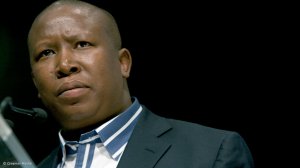When the Economic Freedom Fighters (EFF) spoke of nationalising South Africa’s mines, it meant that the State would own 60% of the operation, said party leader Julius Malema in Johannesburg on Tuesday.
Speaking at an American Chamber of Commerce (AmCham) breakfast, Malema said this move would not chase away investors, as some of the same mining companies that operated in South Africa had willingly ceded 51% ownership to the Botswana government.
Malema referred to Debswana, which was, however, a 50/50 joint venture between diamond miner De Beers and the Botswana government.
The difference between South Africa and Botswana was that the EFF would want to control, and not only own the asset, he said in explaining his party’s policies.
Malema accused “current mining companies” active in South Africa of “maximising profits at all costs”.
“We are not greedy. As long as we can make R1 and not run at a loss, we can run this mine . . . and give people a living wage.”
One way of countering nationalisation would be to offer mine workers shareholding in mining operations, noted Malema.
“How can the EFF nationalise a mine if the workers own 50%?”
If workers were shareholders, they would acknowledge that their performance was linked to a dividend, leading them to work “for their bosses, as well as for themselves”.
“They would know that if they go on strike, their bonuses would not be thousands [of rands], but hundreds [of rands].”
Malema reiterated the EFF’s ambition to nationalise all land, with the State to act as sole custodian.
Nationalisation under EFF policy, however, did not include residential property.
Following the expropriation of all land, the State, as custodian, would review applications for 100-year leases, from black and white people, as well as foreign companies, to use the land in a manner that would benefit South Africa.
Malema lauded President Robert Mugabe for expropriating land from white farmers in Zimbabwe, but not the violent manner in which it was done.
Malema regarded the land issue “as everything” in South Africa, with the rest “just cosmetics”.
“When will black people own land if not through aggressive State intervention?”
He said the willing-seller, willing-buyer principle required willing sellers, of which he believed there were few on the market.
The EFF’s policy did not include the nationalisation of factories and manufacturing plants.
The nationalisation of banks as a policy statement was more centred around the creation of a State-owned bank, providing affordable loans, than targeting the existing big banks, Malema added.
“And if you can’t compete, you will close down.”
In answering a question of increased State involvement in the economy when considering the woeful financials of a number of State-owned entities (SOEs), he noted that private companies also failed, and did so at regular intervals.
“Private companies are not inherently successful.”
He regarded Transnet and the Airports Company South Africa as successful SOEs.
He did, however, criticise African National Congress (ANC) cadre deployment (which then looked like “black failure”) at SOEs, which contributed to their poor financial performance.
“You need to deploy people who know what they are doing.”
Malema noted that the EFF was a proponent of a strong education system, that could be bolstered by private companies and the State providing bursaries to young South Africans to study at the best universities abroad.
He also urged no South African to leave the country, but to remain a part of what was “a robust, but not violent debate”.
“No white man would be driven into the sea. This is your home. Provide your input into how the cake can be divided to benefit everyone. We do not seek black dominance, we seek equality.”
In concluding what the AmCham discussion leader called a “chilling, charming” address, Malema said the EFF, as the country’s third-largest political party, was working to become the official opposition following the 2019 elections, and to ultimately overtake the ruling ANC.
The EFF also hoped to capture some municipalities in next year’s local elections, “running it the EFF way”.
The party was not willing to enter into a coalition with the ANC or the current official opposition, the Democratic Alliance, to manage any municipality, he added.
EMAIL THIS ARTICLE SAVE THIS ARTICLE
To subscribe email subscriptions@creamermedia.co.za or click here
To advertise email advertising@creamermedia.co.za or click here










